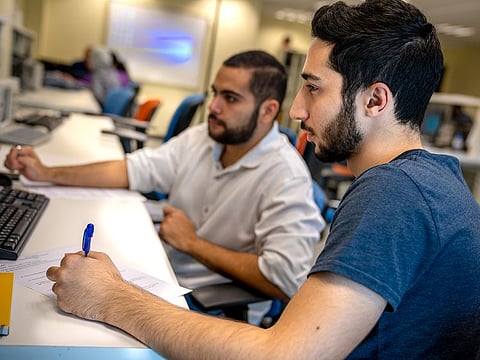Preparing students for a rapidly changing world
RIT Dubai’s campus is designed to equip young people with the skills to succeed

When the Rochester Institute of Technology – Dubai (RIT Dubai) opens the doors of its brand new multimillion dollar campus later in the year, it will offer its students a smart technology-focused environment to help them learn the skills to succeed in a rapidly changing employment market. COVID-19 has underlined how society can suddenly change unpredictably and the university’s President believes that the world will continue to evolve rapidly following the pandemic, especially in the context of technology.
“The fourth industrial revolution is really changing the landscape for the future of graduates and their employment. There are many jobs that we aren’t sure will exist in the future. As a result of this uncertainty and change, we decided that we would like to design a new campus for the future,” says Dr Yousef Al-Assaf, President of Rochester Institute of Technology – Dubai.
The students will be able to use the digital transformation technology in the lab but they will also be able to use it to transform the campus itself.

Innovation at its heart
Sitting at the heart of the new RIT Dubai campus will be a prominent, dome-shaped Innovation Centre, standing as a testament to the university’s approach to education. It will be a place that is open to everyone. The cutting-edge environment will be available to students, faculty, the community and private and public entities. It is a space where people are invited to share ideas and showcase their solutions. “Suitable entities will be offered a physical presence in the campus,” says Dr Al-Assaf.
Innovation will also be an integral part of student journey and curricular. For individuals studying subjects such as business or computing, RIT Dubai will identify certain courses, called innovation nodes, and they will be taught the material of the courses but at the same time, they will learn the skills of innovation and entrepreneurship.
The opportunities that will be available to students and the way the curricular have been designed is conceived to address the soft skills needed for success, such as emotional intelligence, critical thinking, research, time management and communication skills.
Students’ co-op programmes, which are at least four months to one year in duration, are not the only way they are prepared for the workplace. Before they commence their work experience, students are subjected to typical situations encountered in a workplace and then asked to reflect on these with people from industry.
A new approach to smart technology and sustainability
RIT Dubai’s new campus will feature a host of smart technologies. There will be automated gates that can identify students, staff or visitors as well as infrared monitoring, alerting medical staff to people with high temperatures. The campus will also feature connected laboratories and smart air conditioning that is responsive to the amount of people in rooms.
It is technology that Dr Al-Assaf says the students themselves will play a key role in developing. “The students will be able to use the digital transformation technology in the lab but they will also be able to use it to transform the campus itself. With things such as smart classrooms, instead of buying the technology, why don’t we create it?”
Students, departments, businesses, government and the community can suggest solutions for development, which can be resolved on campus through proof of concepts. The focus is on new smart ideas that can be used in the campus but can also be used later, outside the campus.
Beyond smart tech
While technologically advanced, RIT Dubai is also a non-profit university with small class sizes and an individualised approach to teaching. Dr Al-Assaf says that the Dubai campus’ degrees are no different to those in the US. “We provide American degrees. We are an American campus and our students will get the same degree as students who have attended our main campus in Rochester. Students also have the opportunity to spend a year in Rochester in America at the lower [subsidised] fees charged in Dubai.”
Yet, despite its strong American ties, Dr Al-Assaf also says that connecting with the UAE’s private and public sector is central to the university’s philosophy of producing individuals with the skills to succeed in a rapidly changing world and that are ready to contribute to local and regional communities. “We invite experts from industry to speak to and help our students. When we design our programmes, we not only involve industry experts in the design but also in their delivery. We also align our programmes and with public entities including Smart Dubai, Dubai Data, Emirates Association for Future Foresight and Strategic Planning, Ministry of AI and many other public and private organisations; we are global but yet very relevant.
“We are hoping to produce students who are ready to contribute to society and the economy and we hope they have the skills to be robust and the ability to adapt to the unknown situations of the future.”
To learn more, visit here.
This content comes from Reach by Gulf News, which is the branded content team of GN Media.